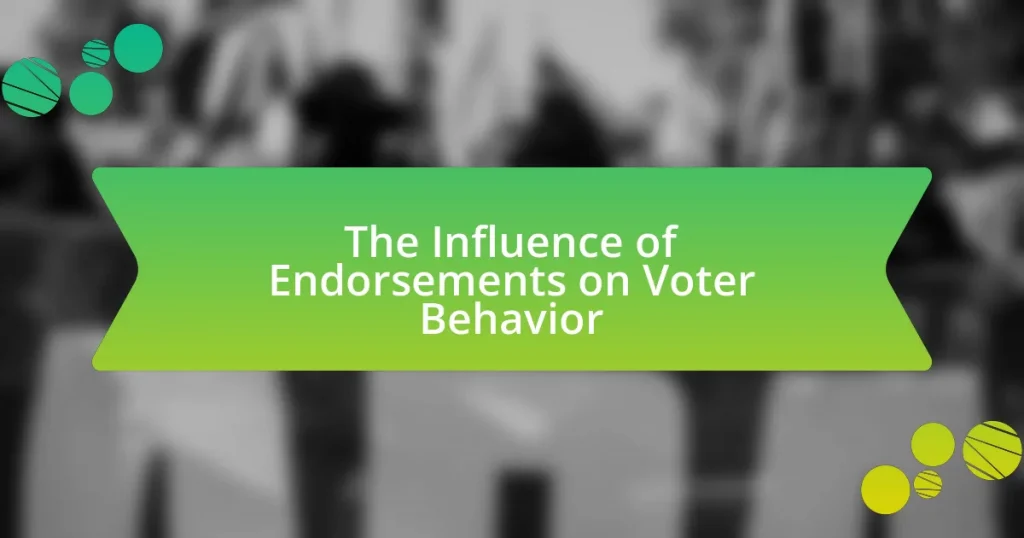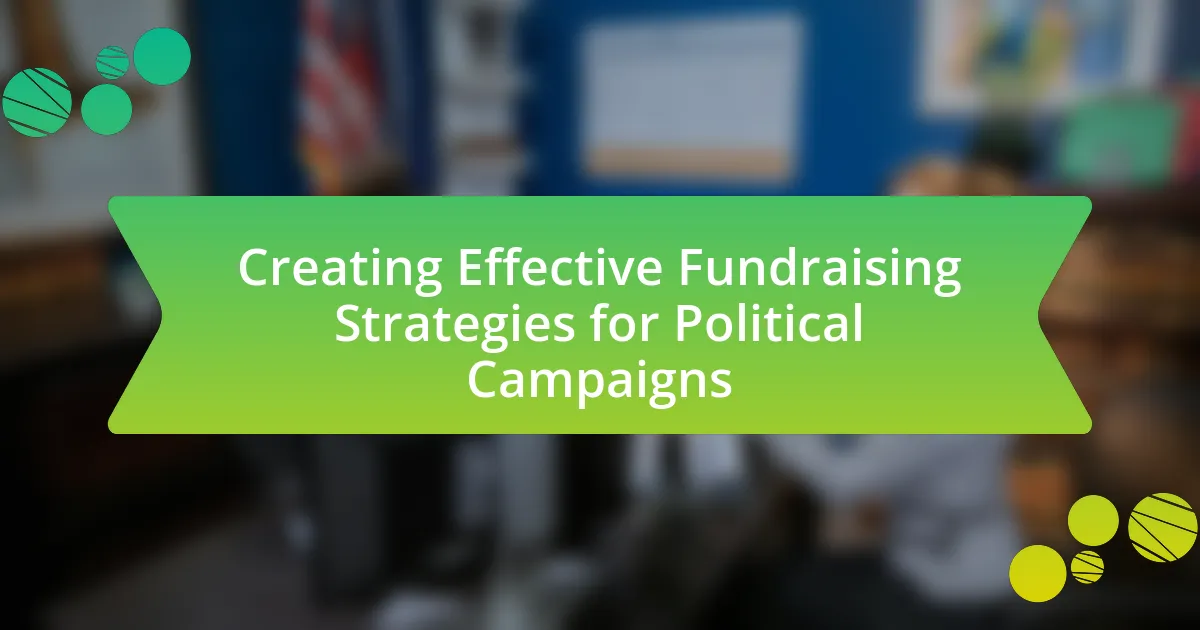The article examines the influence of endorsements on voter behavior, highlighting how endorsements enhance a candidate’s credibility and appeal, particularly among undecided voters. It discusses the types of endorsements that are most impactful, the psychological factors that make them persuasive, and the mechanisms through which they affect voter turnout and engagement. Additionally, the article explores the role of media portrayals and social media in disseminating endorsements, as well as the demographic factors that influence their effectiveness. It also addresses potential drawbacks of endorsements, including voter disillusionment and the risks of over-reliance on endorsements by candidates.
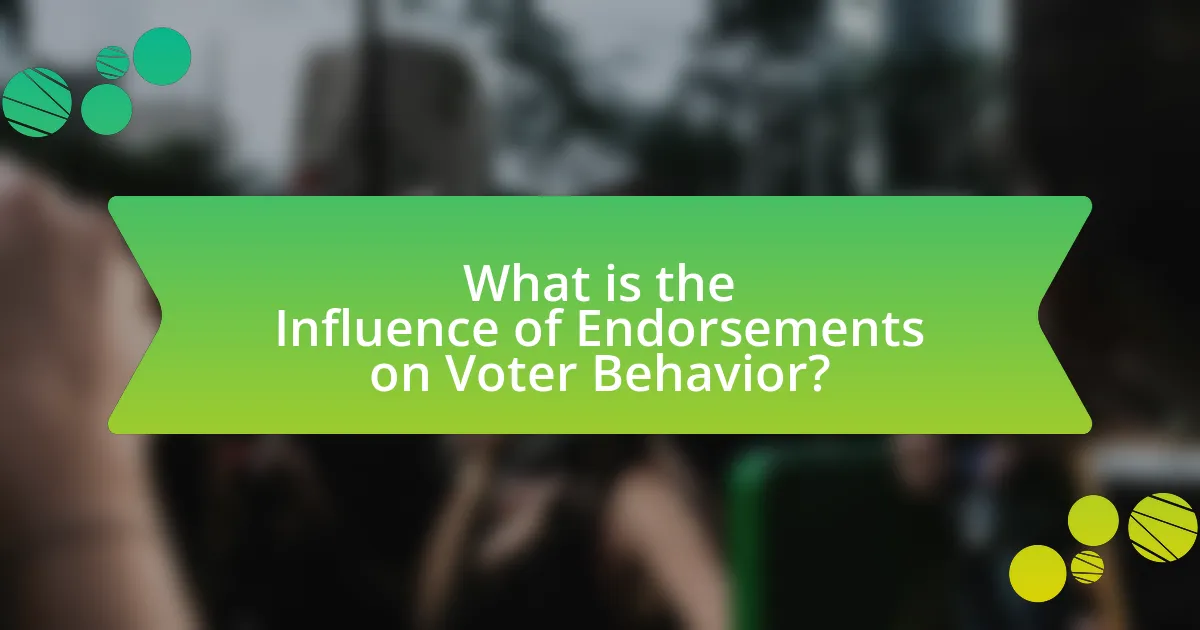
What is the Influence of Endorsements on Voter Behavior?
Endorsements significantly influence voter behavior by enhancing a candidate’s credibility and appeal. Research indicates that endorsements can sway undecided voters, as they often rely on trusted figures or organizations to guide their choices. For instance, a study by the Pew Research Center found that 70% of voters consider endorsements from local leaders as important in their decision-making process. Additionally, endorsements can lead to increased media coverage and public visibility, further shaping voter perceptions and preferences.
How do endorsements shape public perception of candidates?
Endorsements significantly shape public perception of candidates by lending credibility and influence to their campaigns. When a respected individual or organization endorses a candidate, it can enhance the candidate’s image and increase voter trust. For instance, a study by the Pew Research Center found that endorsements from well-known figures can sway undecided voters, as they often rely on the opinions of trusted sources when making electoral decisions. Additionally, endorsements can create a bandwagon effect, where voters feel compelled to support a candidate who is perceived as popular or favored by influential figures. This dynamic illustrates how endorsements not only validate a candidate’s qualifications but also impact the overall narrative surrounding their campaign.
What types of endorsements are most impactful on voters?
Candidate endorsements from trusted figures, such as local leaders, celebrities, and organizations, are the most impactful on voters. Research indicates that endorsements from well-respected individuals or groups can significantly sway public opinion and increase voter turnout. For instance, a study by the Pew Research Center found that endorsements from community leaders can enhance a candidate’s credibility and relatability, leading to a higher likelihood of voter support. Additionally, endorsements from political parties can mobilize their base, as seen in the 2020 U.S. presidential election, where endorsements played a crucial role in shaping voter preferences.
How do endorsements from different sources vary in influence?
Endorsements from different sources vary significantly in influence based on the credibility and relatability of the endorser. For instance, endorsements from trusted figures, such as local community leaders or respected organizations, tend to have a stronger impact on voter behavior compared to endorsements from celebrities or politicians who may lack local relevance. Research indicates that voters are more likely to be swayed by endorsements that resonate with their personal values and experiences, as demonstrated in studies showing that local endorsements can increase voter turnout by up to 10%. This variation in influence underscores the importance of the source’s perceived authenticity and connection to the electorate.
Why are endorsements considered important in elections?
Endorsements are considered important in elections because they can significantly influence voter perceptions and decisions. When a respected individual or organization publicly supports a candidate, it lends credibility and can sway undecided voters. Research indicates that endorsements can increase a candidate’s visibility and perceived legitimacy; for example, a study by the Pew Research Center found that 70% of voters are more likely to support a candidate endorsed by a trusted figure. This demonstrates the power of endorsements in shaping voter behavior and ultimately impacting election outcomes.
What psychological factors make endorsements persuasive?
Endorsements are persuasive due to several psychological factors, including credibility, social proof, and emotional appeal. Credibility arises when endorsers are perceived as trustworthy and knowledgeable, which enhances the likelihood that their recommendations will be accepted. For instance, a study by Eagly and Chaiken (1993) highlights that individuals are more likely to be influenced by sources they view as credible. Social proof plays a role as people tend to follow the actions or beliefs of others, especially in uncertain situations; endorsements from popular figures can create a bandwagon effect, leading to increased acceptance of the endorsed candidate or idea. Additionally, emotional appeal can significantly impact persuasion, as endorsements that evoke strong feelings can create a connection between the endorser and the audience, making the message more memorable and impactful. Research by Cialdini (2001) supports this, indicating that emotional engagement can enhance persuasive communication.
How do endorsements affect voter turnout and engagement?
Endorsements significantly increase voter turnout and engagement by providing credibility and social validation to candidates. Research indicates that endorsements from trusted figures or organizations can sway undecided voters, as they often rely on these endorsements to make informed decisions. For instance, a study by the Pew Research Center found that 60% of voters reported being influenced by endorsements when deciding whom to support in elections. Additionally, endorsements can mobilize specific demographic groups, leading to higher participation rates among those who identify with the endorser. This effect is particularly pronounced in local elections, where community leaders’ endorsements can drive turnout by fostering a sense of connection and urgency among voters.
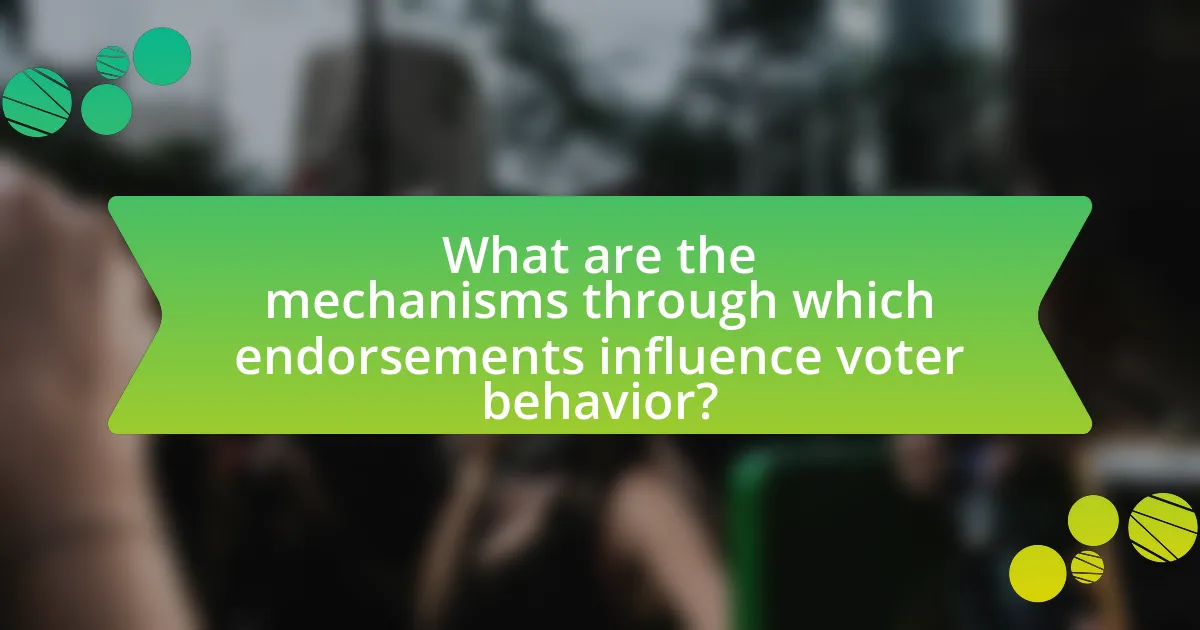
What are the mechanisms through which endorsements influence voter behavior?
Endorsements influence voter behavior primarily through social proof, credibility enhancement, and emotional appeal. Social proof occurs when voters observe respected figures or organizations supporting a candidate, leading them to feel more confident in their choice, as seen in studies showing that endorsements can significantly sway undecided voters. Credibility enhancement is evident when endorsements come from trusted sources, such as local leaders or organizations, which can increase a candidate’s perceived competence and reliability. Emotional appeal is activated when endorsements resonate with voters’ values or aspirations, often leading to increased motivation to support a candidate. Research indicates that endorsements can increase a candidate’s vote share by as much as 10%, demonstrating their substantial impact on electoral outcomes.
How do media portrayals of endorsements affect voter opinions?
Media portrayals of endorsements significantly shape voter opinions by influencing perceptions of candidates’ credibility and appeal. When endorsements are presented positively in the media, they can enhance a candidate’s image, leading to increased voter support; for instance, a study by the Pew Research Center found that 70% of voters consider endorsements from trusted figures as influential in their decision-making process. Conversely, negative portrayals can diminish a candidate’s perceived viability, as seen in the 2016 U.S. presidential election, where media framing of endorsements affected public perception of candidates’ qualifications. Thus, the way endorsements are depicted in media directly correlates with voter attitudes and choices.
What role does social media play in the dissemination of endorsements?
Social media serves as a critical platform for the dissemination of endorsements by enabling rapid sharing and broad reach among users. This immediacy allows endorsements from public figures, organizations, or influencers to be communicated to vast audiences, often leading to increased visibility and engagement. According to a study by the Pew Research Center, 69% of adults in the U.S. use social media, which amplifies the potential impact of endorsements on voter behavior by facilitating discussions and interactions around these endorsements. The interactive nature of social media also encourages users to share endorsements within their networks, further enhancing the spread and influence of these messages.
How do endorsements interact with existing voter biases?
Endorsements can reinforce existing voter biases by aligning with the pre-existing beliefs and preferences of voters. When a candidate receives an endorsement from a trusted figure or organization, it can validate the voter’s prior opinions, making them more likely to support that candidate. Research indicates that endorsements are particularly effective among voters who already have a favorable view of the endorser, as seen in studies where endorsements from well-respected figures significantly increased candidate support among their followers. For example, a study published in the American Political Science Review found that endorsements can amplify partisan biases, leading voters to perceive endorsed candidates more positively, even if their policies are similar to those of opponents.
What demographic factors influence the effectiveness of endorsements?
Demographic factors that influence the effectiveness of endorsements include age, gender, income level, education, and ethnicity. Research indicates that younger voters are more likely to be influenced by endorsements from celebrities or social media figures, while older voters may respond better to endorsements from traditional political figures or community leaders. Gender differences also play a role; women may be more influenced by endorsements that emphasize social issues, while men may prioritize economic arguments. Income level affects endorsement effectiveness as higher-income individuals may trust endorsements from business leaders, whereas lower-income voters might resonate more with endorsements from grassroots organizations. Education level influences how endorsements are perceived, with more educated voters often seeking detailed information about the endorser’s credibility. Ethnic background can shape endorsement effectiveness as well, as endorsements from individuals within the same ethnic group may carry more weight due to shared cultural values and experiences.
How do age and education level affect endorsement reception?
Age and education level significantly influence endorsement reception, with younger individuals and those with higher education levels generally being more receptive to endorsements. Research indicates that younger voters, particularly those aged 18-29, are more likely to be influenced by endorsements due to their openness to new ideas and social media engagement, which amplifies endorsement visibility. Additionally, individuals with higher education levels tend to critically evaluate endorsements, leading to a greater likelihood of considering them in their decision-making process. A study by the Pew Research Center found that 62% of college-educated voters reported being influenced by endorsements compared to 45% of those with a high school education or less. This demonstrates that both age and education level play crucial roles in shaping how endorsements are received and processed by voters.
What role does political affiliation play in the acceptance of endorsements?
Political affiliation significantly influences the acceptance of endorsements, as individuals are more likely to accept endorsements from figures or organizations that align with their political beliefs. Research indicates that partisan alignment enhances the credibility of endorsements; for example, a study by the Pew Research Center found that 70% of voters trust endorsements from political figures of their own party compared to only 30% from opposing party figures. This trend demonstrates that political affiliation acts as a filter through which endorsements are evaluated, leading to greater acceptance of those that resonate with one’s ideological stance.
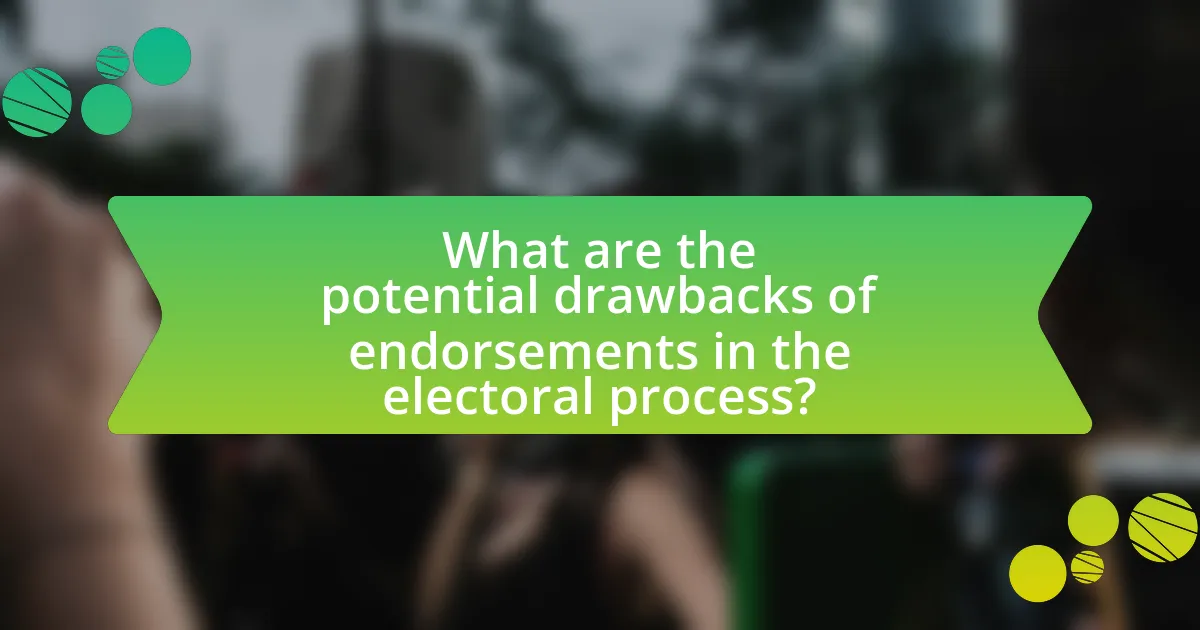
What are the potential drawbacks of endorsements in the electoral process?
Endorsements in the electoral process can lead to potential drawbacks such as the oversimplification of complex political issues and the reinforcement of partisan biases. When prominent figures endorse candidates, voters may rely on these endorsements rather than conducting their own research, which can result in a lack of informed decision-making. Additionally, endorsements can create echo chambers, where voters only hear opinions that align with their existing beliefs, further polarizing the electorate. Research indicates that endorsements can disproportionately influence undecided voters, leading to outcomes that may not reflect the broader electorate’s views. For instance, a study by the Pew Research Center found that 60% of voters reported being influenced by endorsements, highlighting the significant impact they can have on voter behavior.
How can endorsements lead to voter disillusionment?
Endorsements can lead to voter disillusionment by creating a perception that candidates are more aligned with the interests of influential figures or organizations than with the needs of the electorate. When voters feel that endorsements prioritize elite opinions over grassroots concerns, they may become skeptical of the candidates’ authenticity and commitment to public service. For instance, a study by the Pew Research Center found that 62% of voters believe that endorsements often reflect the interests of the endorsers rather than the voters themselves, leading to a disconnect between candidates and their constituents. This disillusionment can result in decreased voter turnout and engagement, as individuals may feel their voices are overshadowed by powerful endorsements.
What are the risks of over-reliance on endorsements by candidates?
Over-reliance on endorsements by candidates can lead to a distorted perception of a candidate’s qualifications and policies. This dependency may result in voters prioritizing endorsements over independent research, potentially leading to uninformed voting decisions. For instance, a study by the Pew Research Center found that 62% of voters consider endorsements important, but this can overshadow critical evaluation of candidates’ platforms. Additionally, excessive reliance on endorsements can create an echo chamber effect, where voters only hear opinions that reinforce their existing beliefs, limiting exposure to diverse viewpoints.
How do negative endorsements impact voter behavior?
Negative endorsements significantly impact voter behavior by decreasing the likelihood of support for the endorsed candidate. Research indicates that when a candidate receives a negative endorsement, it can lead to a shift in voter perception, often resulting in decreased favorability and increased opposition. For instance, a study published in the Journal of Politics found that negative endorsements can amplify existing biases against a candidate, leading to a measurable decline in their polling numbers. This effect is particularly pronounced among undecided voters, who may be swayed by the negative opinions of influential figures or organizations.
What strategies can candidates use to maximize the effectiveness of endorsements?
Candidates can maximize the effectiveness of endorsements by strategically selecting endorsers who resonate with their target audience. This involves identifying influential figures within the community or industry that align with the candidate’s values and policies, thereby enhancing credibility and relatability. For instance, a candidate endorsed by a well-respected local leader can significantly sway undecided voters, as studies show that endorsements from trusted sources can increase voter turnout by up to 20%. Additionally, candidates should actively promote these endorsements through various channels, such as social media, press releases, and campaign events, to amplify their reach and impact. Engaging endorsers in campaign activities, like town halls or interviews, further personalizes the endorsement and reinforces the candidate’s message, making it more persuasive to potential voters.
How can candidates choose the right endorsers for their campaigns?
Candidates can choose the right endorsers for their campaigns by selecting individuals who align with their values, have credibility within the target demographic, and possess a strong public presence. Research indicates that endorsements from respected figures can significantly sway voter opinions; for instance, a study by the Pew Research Center found that 70% of voters are influenced by endorsements from trusted community leaders. Additionally, candidates should consider the endorser’s reach and engagement on social media platforms, as endorsements shared online can amplify their message and resonate with younger voters. By strategically aligning with endorsers who have a genuine connection to the candidate’s platform and audience, candidates can enhance their campaign’s effectiveness and appeal.
What best practices should candidates follow when leveraging endorsements?
Candidates should prioritize authenticity and relevance when leveraging endorsements. Authentic endorsements from respected figures or organizations can significantly enhance a candidate’s credibility and appeal to voters. For instance, a study by the Pew Research Center found that endorsements from local leaders can sway undecided voters by 20%. Additionally, candidates should ensure that the endorsements align with their values and campaign messages, as mismatched endorsements can lead to voter skepticism. Engaging with endorsers in public forums can also amplify the endorsement’s impact, as it provides a platform for the endorser to articulate their support directly to the electorate.
